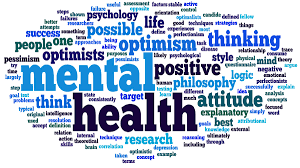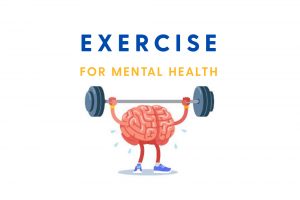Have you ever noticed that when you’re nourishing and challenging your body you have more drive and positive energy? You’re not alone! Our mental wellbeing is hugely influenced by our diet and lifestyle, thanks to a few key mechanisms that are constantly running in the body. Many mental illnesses (depression, anxiety, panic disorder, etc.) are typically thought of as strictly emotion-based or biochemical imbalances, however nutrition and lifestyle play a key role in the duration and severity of these illnesses.

General tips
Keep your gut happy
The gut acts as a major game-player in mental health by producing 90% of our happy hormone, serotonin. The gut loves variety so ensuring an abundance of plant foods can encourage optimal function, ideally, we should aim for 30 different plant foods each week, including fruit, vegetables, herbs, beans and pulses.
Feed your brain with fats
Optimal mental health relies on a healthy brain, which is made up of approximately 60% fats, therefore, prioritising healthy fats in the diet is vital. We can add a small amount of healthy fats to each meal and snack, in the form of oily fish (sardines, trout, anchovies, etc.), avocados, extra virgin olive oil, nuts and seeds, and good quality dairy products.
Calm the blood sugar rollercoaster
Maintaining balanced blood glucose throughout the day is important for continuous mental health and to avoid putting your body in a high-alert state. We can do this by keeping our plates balanced with 1/2 plate of non-starchy vegetables (e.g. carrots, broccoli, spinach), 1/4 plate quality protein, 1/4 plate starchy vegetables or wholegrains and a small handful of healthy fats.
Key Nutrients
B vitamins
B-vitamins are often nicknamed anti-stress nutrients, as this range of vitamins helps to balance the stress response. They are largely found in meat and fish, though sometimes in lentils and seeds, this does increase the need for support in vegan, vegetarian and plant-based diets. When choosing a B-vitamin complex it’s best to opt for a methylated supplement to ensure easy absorption.
Magnesium plays a critical role in brain function and mood, it is calming, supports digestion, muscle, nerve and energy function. While it can be found in the diet, in dark leafy greens, pumpkin seeds and dark chocolate, we can also absorb it well through the skin. Epsom salt baths are rich in magnesium salts and very popular with athletes for their muscle-relaxant properties may also be a simple way to increase circulating magnesium for mental health purposes.
Omega-3 supports mental health through two key pathways. Firstly, it is a potent anti-inflammatory which influences inflammatory-based conditions such as depression. Secondly, the 60% fat in the brain is largely made up of DHA, an omega-3 fatty acid, therefore we need to maintain adequate intakes of this to keep the brain healthy. If you are unable to consume 2-3 portions of oily fish per week, supplementation may be recommended.
When the body is in a panicked state due to stress or long-term ill mental health, vitamin C is rapidly depleted to protect the body against the physical damage mental distress causes. This increases our susceptibility to illness therefore it is important to refresh these vitamin C stores.
As we already know, a healthy gut is essential for the production of neurotransmitters. If our gut bacteria are out of balance we may need to aid this rebalancing through the supplementation of biotics (live bacteria). Lactobacillus rhamnosus and lactobacillus helveticus are two strains known for their mental health benefits, so opt for products which contain these among other strains.
Zinc is known for supporting the body during the stress response by helping to stabilise stress hormone production which plays a role in various mental health conditions. While zinc can be found in foods such as oysters, tofu, red meat and seeds, in some cases we need to increase our daily intake through supplementation.
It’s no surprise that our sunshine vitamin plays a role in seasonal affective disorder (SAD), the symptoms of which are very similar to depression, including fatigue, difficulty concentrating and depressed mood. Vitamin D supplementation has been shown to manage SAD symptoms in various research studies. Vitamin D supplementation is recommended for everyone in the UK between the months of September and March.
The is a long list of nutrients that support mental health but these are the key nutrients that should be prioritised first, followed by these nutrients and herbs:
-
5-HTP,
-
acetyl l-carnitine,
-
Choline,
-
Rosemary,
-
Lemon balm,
-
Ginkgo,
-
Lavender,
- Valerian.
Lifestyle tips
Mindful eating

Mindful eating is the practice of mindfulness around food, allowing you to support your digestive system function optimally and absorb the nutrients our body and brain require for daily life. If you find yourself eating when stressed or distracted, pause, take 5 deep breaths prior to eating, chew thoroughly and eliminate distractions, such as phones or television while eating.
Movement

Exercise is known for releasing feel-good hormones, such as endorphins, however it’s also excellent for managing mood disorders, such as depression. While low energy may be a hindrance, gentle exercise such as walks and yoga can help to increase energy in the long-run.
Sources
5-HTP and Panic Disorders
Exercise
Vitamin D and depression
Nutrition in Mental Disorders
Magnesium and Mental Health
Nutrition, Depression and Mental Illness
This entry was posted in Health Interlink News. Bookmark the permalink.



